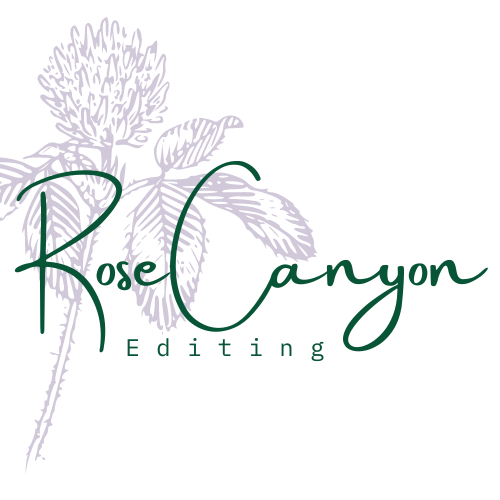

Rose Canyon
Editing
Editing for Horror, Science Fiction, and Fantasy Writers

Curious about the editing process?
Rose Canyon Editing provides a complimentary sample edit so you know what to expect. A manuscript evaluation can also be a good place to start if you're not sure if your book is ready for a copyedit.

Looking for writing resources?
The topics and resources page is full of writing advice and grammar knowledge. Everything from sentence structure to imposter syndrome is covered, focusing on topics that will help educate and motivate writers. The goal is to get your book into the hands of readers, no matter where you are in the process.

About Rose Canyon Editing
Hi, I'm Ashley and I love stories. I became an editor because I care about the quality of those stories, and I enjoy reading during work hours. I also care about education and training, so I have a degree from the University of Utah, a copyediting certificate from ACES, and a certificate from UC Berkeley's Professional Sequence in Editing program.
Ready to talk editing?
Contact me at
info@rosecanyonedit.com
Manuscript Evaluation
If you're not sure what type of editing would be right for your manuscript, an evaluation is a good place to start. This is a chance for a big-picture critique complete with a written report and feedback. The focus will be on structural, logical, and organizational improvements without any grammatical corrections.
Pricing from $50 for a partial manuscript evaluation
Copyediting
Copyediting will provide polish and correct grammar, spelling, and punctuation. Usage issues, consistency, clarity, and minor formatting problems will also be addressed. You will receive a style sheet along with your marked copy.
Before beginning, a sample edit of one or two chapters will be returned to you for review. The sample edit will help you see what to expect from the copyedit and whether this will be a good fit for you and your manuscript.
Contact me at info@rosecanyonedit.com with your editing goals and budget to find out more.
Price determined after review
Editing
Topics and Resources
Rose Canyon

It can be confusing to know what type of editing your manuscript needs. You may even be confused about what the different types of editing are! Let's start with the big-picture work that should be done first and move to the smaller details and formatting that comes last.
The first step is developmental editing. Developmental editing works on the structure of the book and other big-picture improvements. During a developmental edit, you might rewrite chapters, change characters that aren't working, or adjust for genre expectations.
Next comes line editing. This takes place at the sentence level. A line editor will improve the readability of the text for the intended audience. They specialize in clarity and help polish your voice.
After that is copyediting. Copyediting works on grammar, spelling, punctuation, and clarity. A copyeditor will also clean up problems with repetition, tense, voice, and style.
Last comes proofreading. Proofreading is a last chance to find any remaining errors and format the text. Anything that makes it past this final phase is truly an olympian error!
Developmental Editing
Line Editing
Copyediting
Proofreading
Have you ever stared at a sentence you wrote and wondered why it seems wrong? You’ve got a perfectly good clause here, so why does it sound strange? Is it a misplaced comma? There are so many grammar rules to remember, and you’re sure you’ve broken one or two of them. But which ones?
Editors have stacks of books about grammar to help them as they tackle tangled language, but they refer to some pages more than others. Sitting next to me at my desk is one of my most-used reference sheets: a guide to sentence structure. If you remember from English class, there are four sentence types. We call them simple, compound, complex, and compound-complex. If you want to know what’s wrong with your sentence, comparing it to the four sentence structures is a good place to start.
The first step is to break your sentence down into independent and dependent clauses. A clause is a meaningful group of words with a subject and a verb. An independent clause can stand on its own—it’s independent. A dependent clause cannot.
Independent = S + V
Dependent = SubC + S + V
S = Subject, V = Verb, SubC = Subordinating Conjunction
A subordinating conjunction is a word like before, as, while, because, although, since, or when that gives you a clue that the subject and verb that follows it can’t stand alone. When I write a sentence that begins with the word when, you know that the first part of the sentence is going to be the dependent clause. The independent clause will follow it.
Dependent = “When I write a sentence that begins with the word when,”
Independent = “…you know that the first part of the sentence is going to be the dependent clause.”
You can see that the dependent clause couldn’t be its own sentence, but the independent clause could. Why is this important? Because identifying the independent and dependent clauses shows us what type of sentence it is.
Simple = one independent clause that may have a compound subject, compound verb, or both
The cat pounced.
Compound = two or more independent clauses separated by a coordinating conjunction, semicolon, or colon
The coordinating conjunctions are for, and, nor, but, or, yet, and so. (FANBOYS)
Independent clause, coordinating conjunction + independent clause
Independent clause: independent clause
Independent clause; independent clause
The cat pounced, and the mouse perished.
Complex = one independent clause and one or more dependent clauses
Independent clause + dependent clause
Dependent clause, + independent clause
Before my cat ran out the door, I caught her.
Compound-Complex = one or more dependent clauses and two or more independent clauses joined by a coordinating conjunction, semicolon, or colon
Independent clause + independent clause + dependent clause
Dependent clause, + independent clause + independent clause
Independent clause + dependent clause + independent clause
I caught my cat before she ran out the door, but she scratched me.
First, it helps with punctuation placement. If I begin with a dependent clause, I need a comma before the independent clause. If I have two independent clauses (a compound sentence), I either need a comma followed by a coordinating conjunction after the first clause, a semicolon between the clauses, or a colon between the clauses. If I can break down the sentence into clauses and identify the structure, I know where to place most of the punctuation.
Second, knowing your sentence structure helps you identify errors. If you have two independent clauses joined only by a comma, that’s a comma splice. If you have a dependent clause and no independent clauses, that’s a sentence fragment. If you write a compound sentence without joining the clauses correctly, that’s a run-on sentence.
In summary, knowing your sentence types is a good start to the self-editing process. Fixing problems with sentence structure can improve your work quickly and help you identify growth opportunities in your writing. Plus, if you know the rules of grammar, you know how to break them when the time is right!
Let's Start with a Clause
There are Four Sentence Structures
What Makes Sentence Structure so Useful?
Have you ever been in the middle of a really interesting conversation when you suddenly lose the flow because you can’t remember a word? It’s on the tip of your tongue but you just can’t get it out, and then you start questioning everything you’ve ever known because of this one word that you can’t remember. This is when I start to feel the impostor syndrome creep up on me.
I’m supposed to know a lot about English, right? I’m an editor—of course I should. So why can’t I remember that word?
And the internal dialogue continues. It’s easy to question yourself even when you know that you’re an expert. No amount of education and experience can silence that little voice that loves to tell us that we’re incompetent.
As writers, editors, and creators in our fields we often find ourselves with a need to self-promote. Editors, as behind-the-scenes specialists, can find this especially difficult. We want to stay in the background. We’re content to play the support role. It’s not easy to put yourself out there, especially if it’s not really in your personality wheelhouse. Writers can be very similar. We may be able to write with ease, but sharing it with another person is a different story.
One of the most frequent contributors to impostor syndrome is that sneaky little shadow that follows us everywhere—perfection. Ah, our favorite frenemy. It exists as a concept, but not as a reality. Nothing will ever be perfect, but no matter how much our logical brain knows the truth we still let that thought hang in the air above our keyboards as we fervently work.
Writing groups and collaborative opportunities are one way to boost that morale and confidence level higher. Interacting with other writing professionals, both experienced and new, helps us see where we are in the spectrum of growth and development. A few words of encouragement or relating to the problems of someone else can help us see that we do belong in this field and we aren't the outliers we imagined during those internal questioning sessions.